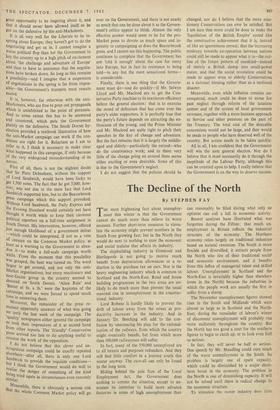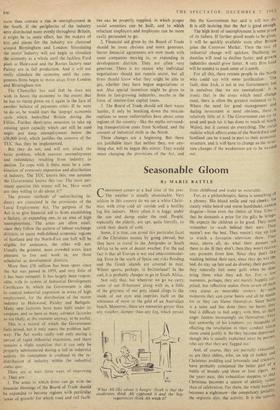The Decline of the North
By STEPHEN FAY
THE most frightening fact about unemploy- ment this winter is that the Government cannot do much more than relieve its worst excesses. Further short-term measures to stimu- late the economy might prevent numbers in the South from growing fast; but in the North they would do next to nothing to cure the economic and social malaise that affects its industry.
The shipbuilding industry in Greenock and Hartlepools is not going to receive much benefit from depreciation allowances or a re- duction in the purchase tax on cars. Nor is the heavy engineering industry which is common to Scotland and the North-East. Road and house building programmes in the two areas are un- likely to do much more than prevent the usual seasonal rise in unemployment in the construc- tional industry.
Lord Robens is hardly likely to prevent the drift of labour away from the mines as pro- ductivity increases in the industry. And in January Dr. Beeching will add to the con- fusion by announcing his plan for the rational- isation of the railways, from which the country might eventually benefit, but from which more than 100,000 railwaymen will suffer.
In fact, many of the 550,000 unemployed are to all intents and purposes redundant. And they will find little comfort in a journey south this winter anyway. The cure-all can only be found in the long term.
Hiding behind the pale face of the Local Employment Act, the Government does nothing to correct the situation, except to an- nounce its intention to build more advance factories in areas of high unemployment than can reasonably be filled during what only an optimist can call a lull in economic activity.
Recent analyses have illustrated what wap forgotten during the Fifties: that much un- employment in Britain reflects the industrial structure of the economy. The Northern economy relies largely on traditional industries based on natural resources. The South is more flexible and diversified; it attracts people from the North who tire of their traditional social and economic environment, and it benefits' from this influx of managerial talent and skilled labour. Unemployment in Scotland and the North-East is invariably higher than elsewhere (even in the North) because the industries in which the people work are usually the first to suffer from a slump.
The November unemployment figures showed rises in the South and Midlands which were almost as large as in Scotland and the North- East; during the remainder of labour's winter of discontent unemployment will probably rise more uniformly throughout the country. But the North has too good a start for the southern figures to begin to catch up, or to look even half as serious.
In fact, they will never be half as serious. One speech by Mr. Maudling could cure much of the worst unemployment in the South. Its problem is largely one of spare capacity, which could be diminished by a major short- term boost in the economy. The problem in the North is one of diminishing capacity. It will not be solved until there is radical change in the economic structure.
To stimulate the motor industry does little
more than contain a rise in unemployment in the South. If the peripheries of the industry were distributed more evenly throughout Britain, it might be to more effect, but the makers of bits and pieces for the industry are clustered around Birmingham and London. Stimulating the motor industry will not begin to stimulate the economy as a whole until the luckless Ford plant at Halewood and the Rootes factory near Paisley are in full production. And it will not really stimulate the economy until the com- ponents firms begin to move away from London and Birmingham too.
The Chancellor has said thak he does not wish to boost the economy to the extent that he has to stamp flown on it again in the face of
another balance of payments crisis. If he were to do so, he would start the `stop-go' economic
cycle which bedevilled Britain during the
Fifties. Further short-term measures to take up existing spare capacity which can still be used
might just keep unemployment below the 650,000 level, which justifies the concern of the TUC that they be implemented,
But they do not, and will not, attack the basic problem, which remains unemployment
and redundancy resulting from industry in
decline. To cope with it there must be a com- bination of economic expansion and distribution
of industry. The TUC knows this; one assumes the Government knows this too. The most per- tinent question this winter will be, 'How much are they willing to do about it?'
The present methods of redistributing in- dustry are contained in the provisions of the Local Employment Act. The purpose of the Act is to give financial aid to firms establishing a factory, or expanding one, in an area of high unemployment. The areas are often small.
since they follow the pattern of labour exchange districts; in many well-defined economic regions of Scotland and the North-East one half will be eligible for assistance, the other will not. Usually the grimiest, most crowded areas, least pleasant to live and work in, are those scheduled as development districts.
More than £70 million has been spent since the Act was passed in 1959, and very little of
it has been misspent. It has largely been respon-
sible. with its system of Industrial Development Certificates by which the Government is able to control industrial expansion in areas of high employment, for the distribution of the motor industry to Halewood, Paisley and Bathgate.
Many new factories have been built under its
auspices, and so have as many advance factories as are likely, at the moment anyway, to be useful. This is a record of which the Government feels proud. but it only meets the problem half- way. The Act works really well only during a period of rapid industrial expansion, and there remains a slight suspicion that it can only be properly administered during a lull in industrial activity. Its conception is confined to the re- distribution of industry within the industrial status qua.
There are at least three ways of improving it. They are: I. The areas to which firms can go with the financial blessings of the Board of Trade should be expanded to become regions with particular `areas of growth' for which road and rail facili-
ties caa be properly supplied, in which proper social amenities can be built, and to which reluctant employers and employees can be more easily persuaded to go.
2. Financial aid given by the Board of Trade should be more obvious and more generous. Secret financial agreements are now made with some companies moving to, or expanding in development districts. They are often very generous. There is no reason why individual negotiations should not remain secret, but all firms should know what they might be able to get, whether they have begun negotiations or not. Also special incentives might be given to firms in fast-growing industries, maybe in the form of interest-free capital loans.
3. The Board of Trade should sell their wares harder, if only by breaking down the miscon- ceptions so many industrialists have about sonic regions of the country—like the myths surround- ing transportation costs from Scotland, and the amount of industrial strife in the North.
These changes are a beginning. But there are justifiable fears that neither they, nor any- thing else, will be begun this winter. They would mean changing the provisions of the Act, and
this the Government has said it will not do. It is still insisting that the Act is good enough. The high level of unemployment is some proof of its failure. If further proof needs to be given, it will be quickly available soon after Britain joins the Common Market. Then the rate of industrial change will quicken. Declining in- dustries will tend to decline faster, and growth industries should grow faster. A very firm hand will be needed to push some of it north. For all this, there remain people in the North who could say with some justification: 'The fault, dear Jock, is not in our Government, but in ourselves that we are unemployed.' It 15 ironic that in the areas which need change most, there is often the greatest resistance to it. Where the need for good management and daring investment is most obvious, there is relatively little of it. The Government can try, to prod and push (as it has done in much of South Wales), but it cannot do everything. The social malaise which affects areas of the North-East and Scotland can be traced in part to their economic structure, and it will have to change as the struc- ture changes if the weaknesses are to be weeded out.







































 Previous page
Previous page